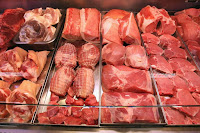A decline in carbon-intensive foods like beef and orange juice has shrunk individuals' carbon footprints between 2005 and 2014
The carbon footprint of the average American's diet has shrunk by about 9 percent, largely because people are eating less beef, according to a new report.
Changes in the American diet—lower consumption of not only beef, but orange juice, pork, whole milk and chicken—meant that the average American's diet-related greenhouse gas emissions dropped from 1,932 kilograms in 2005 to 1,762 in 2014.
The analysis "just shows that small changes in our diets have impacts," said Sujatha Bergen, a food specialist at the Natural Resources Defense Council. "There's a very concrete association between reduced red meat consumption and reduced emissions."
The biggest contributor to the reduction was a decline in beef consumption of about 19 percent over the course of the decade, adding up to a cumulative reduction of 185 million tons of climate change pollution. Total emissions cuts from dietary changes were 271 million tons. During that time, overall U.S. greenhouse gas emissions averaged more than 6 billion tons a year.
Despite the improvement, the dietary changes pale by comparison to overall American emissions from a wealthy lifestyle. The average American has a carbon footprint of about 16 tons and the average U.S. car accounts for roughly 5 tons of emissions per year. China is the world leader in total carbon pollution, but the average Chinese citizen is responsible for less than half that amount.
Americans eat more beef per capita than any other country except Argentina and Uruguay, and beef still contributed more than a third of the United States' diet-related climate emissions — about 34 percent in 2014.
Read more at Eating Less Beef Dropped Americans' Carbon Emissions by 9%

No comments:
Post a Comment